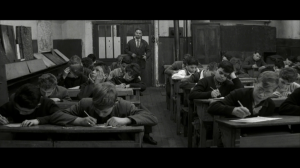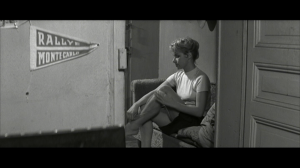Starring: Jean-Pierre Leaud, Albert Remy, Claire Maurier
Director: Francois Truffaut
Rating: 10/10
 The 400 Blows (1959) has as good a claim as any to be the key film of the French New Wave. Truffaut’s first feature, made when he was just 27, channelled the spirit of the great French cinema of the 1930s, of Jean Renoir and Jean Vigo, especially the latter’s Zero de Conduite. Based on Truffaut’s own childhood (with a script by Marcel Moussy), it portrays, with aching sympathy and insight and robust good humour, the life of a 13-year-old boy who seems destined for the wrong side of the tracks.
The 400 Blows (1959) has as good a claim as any to be the key film of the French New Wave. Truffaut’s first feature, made when he was just 27, channelled the spirit of the great French cinema of the 1930s, of Jean Renoir and Jean Vigo, especially the latter’s Zero de Conduite. Based on Truffaut’s own childhood (with a script by Marcel Moussy), it portrays, with aching sympathy and insight and robust good humour, the life of a 13-year-old boy who seems destined for the wrong side of the tracks.
We first meet Antoine Doinel (Jean-Pierre Leaud) getting into trouble at school (the high desks make the pupils look like Dickensian clerks but yes, it was a real school in Paris). Put in detention by a sneering teacher, Antoine writes a poem on the grubby wall, like a prisoner scratching marks in his cell. He sees himself as a romantic rebel, and he looks a bit like one to us too – his black polo neck marks him out as a beatnik, he walks with a belligerent swagger (Leaud brought much of this to the role; by all accounts Truffaut himself was more withdrawn and physically timid).
desks make the pupils look like Dickensian clerks but yes, it was a real school in Paris). Put in detention by a sneering teacher, Antoine writes a poem on the grubby wall, like a prisoner scratching marks in his cell. He sees himself as a romantic rebel, and he looks a bit like one to us too – his black polo neck marks him out as a beatnik, he walks with a belligerent swagger (Leaud brought much of this to the role; by all accounts Truffaut himself was more withdrawn and physically timid).
 Home is a cramped flat, where he has a fold-out bed in the hall next to the front door. Here we see a different side of Antoine. His parents exercise their power over him whimsically, so that he lives in a climate of tempests and occasional bursts of sunshine. His mother (Claire Maurier) is spiteful and orders him about like a skivvy, and there’s a suspicion that she spends money meant for his upkeep on herself (she has silk stockings and a chic hairdo, he sleeps in a torn nightgown). His step-dad (Albert Remy) seems nicer and more easy-going, but his good humour can wear off quickly too, and he doesn’t see it as his place to stand up for a kid
Home is a cramped flat, where he has a fold-out bed in the hall next to the front door. Here we see a different side of Antoine. His parents exercise their power over him whimsically, so that he lives in a climate of tempests and occasional bursts of sunshine. His mother (Claire Maurier) is spiteful and orders him about like a skivvy, and there’s a suspicion that she spends money meant for his upkeep on herself (she has silk stockings and a chic hairdo, he sleeps in a torn nightgown). His step-dad (Albert Remy) seems nicer and more easy-going, but his good humour can wear off quickly too, and he doesn’t see it as his place to stand up for a kid  who isn’t his own. Antoine reacts to both of them with animal watchfulness, fearing their unpredictable rages. For their part, they long to be rid of him (his mother fantasises about sending him to an orphanage, his step-dad talks wistfully of military school) and then rail at him when he calls their bluff and runs away.
who isn’t his own. Antoine reacts to both of them with animal watchfulness, fearing their unpredictable rages. For their part, they long to be rid of him (his mother fantasises about sending him to an orphanage, his step-dad talks wistfully of military school) and then rail at him when he calls their bluff and runs away.
 It doesn’t take much for his life to slide toward ruin. A series of comic blunders gets him deeper and deeper into trouble. There’s a haunting sequence where he tries sleeping rough and ends up wandering Paris until dawn – you feel the vastness of the city and you fear for him; it’s like watching a kitten teetering along a narrow fence. His mother is only too eager to throw in the towel and pass her problem child onto the state – no doubt it’s what she’s secretly wanted all along. The section of the movie where young Antoine is put into the system is horrendous, and not just because by now our sympathy with him is so deep it’s like watching your own flesh and blood being banged up behind bars; it’s horrendous because what we’re seeing is the methodical, step by step process of a life being thrown away.
It doesn’t take much for his life to slide toward ruin. A series of comic blunders gets him deeper and deeper into trouble. There’s a haunting sequence where he tries sleeping rough and ends up wandering Paris until dawn – you feel the vastness of the city and you fear for him; it’s like watching a kitten teetering along a narrow fence. His mother is only too eager to throw in the towel and pass her problem child onto the state – no doubt it’s what she’s secretly wanted all along. The section of the movie where young Antoine is put into the system is horrendous, and not just because by now our sympathy with him is so deep it’s like watching your own flesh and blood being banged up behind bars; it’s horrendous because what we’re seeing is the methodical, step by step process of a life being thrown away.
And yet, amazingly, The 400 Blows is far from being a depressing, downbeat  experience. The French title – which sounds grim translated literally into English, something to do with death by a thousand cuts perhaps – is actually slang for “raising hell”, and the film is full of enchanted interludes and transports of joy: the infectious high spirits when Antoine and his best friend René (Patrick Auffay) skive off school and run free around their favourite haunts; the surreal comedy when Antoine stays over at René’s vast, cat-infested apartment, where they smoke cigars and play board games late into the night under the watchful eye of a stuffed racehorse; the daringness of stealing a saucy lobby card from a cinema foyer. As filmed in black and white widescreen by Henri Decae (a first-class cinematographer
experience. The French title – which sounds grim translated literally into English, something to do with death by a thousand cuts perhaps – is actually slang for “raising hell”, and the film is full of enchanted interludes and transports of joy: the infectious high spirits when Antoine and his best friend René (Patrick Auffay) skive off school and run free around their favourite haunts; the surreal comedy when Antoine stays over at René’s vast, cat-infested apartment, where they smoke cigars and play board games late into the night under the watchful eye of a stuffed racehorse; the daringness of stealing a saucy lobby card from a cinema foyer. As filmed in black and white widescreen by Henri Decae (a first-class cinematographer  who also DP’d on classics such as Le Samourai), Paris can go in a trice from looking like the most lonely place in the world to the most magical, and back again. It’s a mood reflected perfectly in Jean Constantin’s evocative music, which sounds like a sad funfair.
who also DP’d on classics such as Le Samourai), Paris can go in a trice from looking like the most lonely place in the world to the most magical, and back again. It’s a mood reflected perfectly in Jean Constantin’s evocative music, which sounds like a sad funfair.
We tend to think of Nouvelle Vague films as rough-hewn, but The 400 Blows comes across as a seamless piece of filmmaking – never more so than on this Artificial Eye release. The DVD seen by the Least Picture Show has just the slightest touch of grain but no dirt or scratches and a full range of silky blacks and greys, bringing out all the grit and poetry of the location shooting (filmed in Dyaliscope, the French equivalent of CinemaScope). Extras include a brisk 4-minute intro, and the original screen tests that so convinced Truffaut that he’d found his Antoine – there is Leaud, 14 years old, alert, bubbling with confidence, and already wearing Doinel’s checked jacket. The disc also features an audio commentary by Robert Lachenay, the assistant director and Truffaut’s best friend at school – yes, he’s René! Offering an invaluable perspective on the film, he reveals that they focussed more on Leaud than was originally planned because he was so magnetic on camera, and points to the differences between Leaud’s Antoine and the  real Truffaut. He also reminds us that, although the film is set in the late ’50s, Truffaut’s troubled early teens actually took place during the German Occupation (which perhaps explains why he lived in such picturesque squalor despite both of his parents having jobs).
real Truffaut. He also reminds us that, although the film is set in the late ’50s, Truffaut’s troubled early teens actually took place during the German Occupation (which perhaps explains why he lived in such picturesque squalor despite both of his parents having jobs).
THE ENDING
If you haven’t seen the film before, don’t read this. If you have, you’ll know that The 400 Blows has one of the most famously inconclusive endings in all of French cinema. Antoine escapes from reform school during a games period and then runs and runs until he gets to the sea. Then he stops, turns to face the camera and things end on a freeze-frame. Is this a happy ending? Is it sad? For an answer, it’s worth referring back to the beginning of the film again. The first scene, in that grimy schoolroom, starts with a low, crouching shot that imitates the lowly posture of the pupils, cutting off people’s heads. Antoine hoves into view. We see his head from the side, the back, then flashes of his face; as the scene unfolds, he drifts around the edges of the frame. The camera always seems to be questing for him unsuccessfully, and this establishes the keynote to his character. Throughout the film, he’s essentially an animal in the grip of the fight or flight impulse, and his answer, always, is flight. At the end of the movie, he’s fled as far as he can go. Now there he is, centre-frame, looking back at us, and it feels like a moment of growth and realization. Surely it’s time to stop flying and start fighting.
Francois Truffaut’s Stolen Kisses, Bed and Board and The Soft Skin are also being released by Artificial Eye on DVD and Blu-ray in August, 2014.
